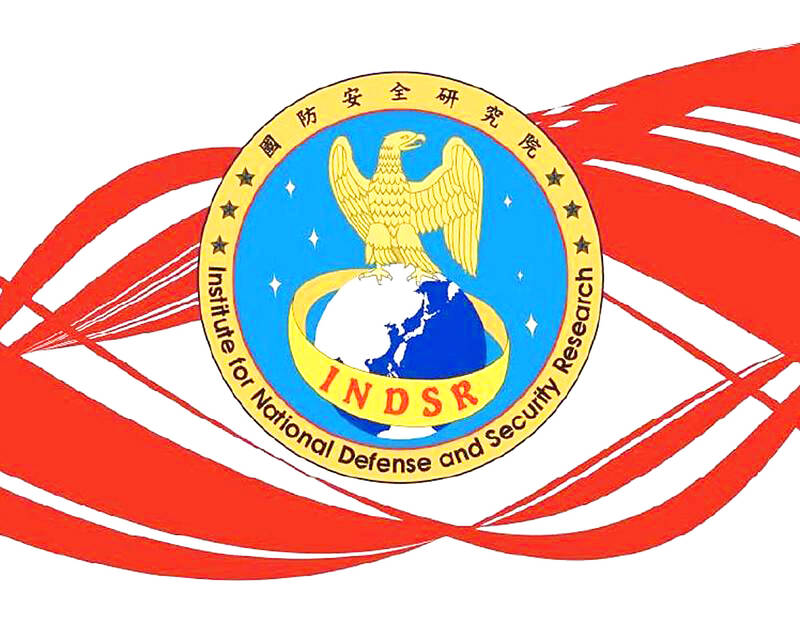Taiwan-US defense research exchanges have been elevated to a “semi-official” level, the Institute for National Defense and Security Research's annual report to the Legislative Yuan suggested.
The institute was last year invited by the US Indo-Pacific Command to participate in discussions about the Chinese Communist Party’s (CCP) military strategy against Taiwan, the report said.
The request indicates the level of importance the US Indo-Pacific Command places on Taiwan’s responses to the changing situation in the Taiwan Strait, the report said.

Photo: Aaron Tu, Taipei Times
This was also highlighted by the institute last year being invited for the first time to trilateral talks with Japanese and US officials, including some from the US Department of Defense’s (DOD) Defense Threat Reduction Agency.
The institute, which is Taiwan’s only official defense think tank, last year also participated in exchanges with think tanks in Australia, Europe, Japan, South Korea, the US and other countries, the report said, adding that those attending the exchanges often included active-duty military personnel and officials.
For example, one of the exchanges the institute joined was an electronic warfare symposium at the invitation of the Association of Old Crows and the US Indo-Pacific Command, the report said.
It also discussed the US redefining information warfare in response to current trends.
DOD officials who attended exchanges discussed in depth whether the US and Japan would intervene in the event of a conflict in the Taiwan Strait, how such an intervention would occur and how to send the right signals to deter China from starting a conflict, the report said.
In May last year, the institute joined 12 representatives from the National Security Council, the Ministry of Foreign Affairs, the Executive Yuan’s Office of Trade Negotiations, and the Ministry of National Defense to attend the Global Security Forum organized by the Center for Strategy and International Security.
Participants included Rick Waters, then-US deputy assistant secretary at the US Department of State’s Bureau of East Asian and Pacific Affairs; Rush Doshi, then-China affairs director at the US National Security Council; US Deputy Assistant Secretary of Defense for China, Taiwan and Mongolia Michael S. Chase; US Air Force Headquarters Deputy Director for Concepts and Strategy Jessica Powers; and former Royal Australian Air Force general Mark Binskin.
The institute last year also joined a delegation from the defense ministry that attended a military exercise on “gray zone” tactics with the US think tank RAND Corp.
The results of the exercise were released at the Taiwan-US Monterey Talks later in the year.
Last year the first Japan-Taiwan Strategic Dialogue was also held, during which the institute met with retired Japanese generals, as well as high-ranking officials in the Japanese government and NATO.
The institute said that it was “deeply impressed by the scale of exchanges and contacts between Japan and NATO, the linking capabilities between the two, and the depth of mutual understanding on various issues displayed by both sides.”

A magnitude 7.0 earthquake struck off Yilan at 11:05pm yesterday, the Central Weather Administration (CWA) said. The epicenter was located at sea, about 32.3km east of Yilan County Hall, at a depth of 72.8km, CWA data showed There were no immediate reports of damage. The intensity of the quake, which gauges the actual effect of a seismic event, measured 4 in Yilan County area on Taiwan’s seven-tier intensity scale, the data showed. It measured 4 in other parts of eastern, northern and central Taiwan as well as Tainan, and 3 in Kaohsiung and Pingtung County, and 2 in Lienchiang and Penghu counties and 1

FOREIGN INTERFERENCE: Beijing would likely intensify public opinion warfare in next year’s local elections to prevent Lai from getting re-elected, the ‘Yomiuri Shimbun’ said Internal documents from a Chinese artificial intelligence (AI) company indicated that China has been using the technology to intervene in foreign elections, including propaganda targeting Taiwan’s local elections next year and presidential elections in 2028, a Japanese newspaper reported yesterday. The Institute of National Security of Vanderbilt University obtained nearly 400 pages of documents from GoLaxy, a company with ties to the Chinese government, and found evidence that it had apparently deployed sophisticated, AI-driven propaganda campaigns in Hong Kong and Taiwan to shape public opinion, the Yomiuri Shimbun reported. GoLaxy provides insights, situation analysis and public opinion-shaping technology by conducting network surveillance

‘POLITICAL GAME’: DPP lawmakers said the motion would not meet the legislative threshold needed, and accused the KMT and the TPP of trivializing the Constitution The Legislative Yuan yesterday approved a motion to initiate impeachment proceedings against President William Lai (賴清德), saying he had undermined Taiwan’s constitutional order and democracy. The motion was approved 61-50 by lawmakers from the main opposition Chinese Nationalist Party (KMT) and the smaller Taiwan People’s Party (TPP), who together hold a legislative majority. Under the motion, a roll call vote for impeachment would be held on May 19 next year, after various hearings are held and Lai is given the chance to defend himself. The move came after Lai on Monday last week did not promulgate an amendment passed by the legislature that

Taiwan is gearing up to celebrate the New Year at events across the country, headlined by the annual countdown and Taipei 101 fireworks display at midnight. Many of the events are to be livesteamed online. See below for lineups and links: Taipei Taipei’s New Year’s Party 2026 is to begin at 7pm and run until 1am, with the theme “Sailing to the Future.” South Korean girl group KARA is headlining the concert at Taipei City Hall Plaza, with additional performances by Amber An (安心亞), Nick Chou (周湯豪), hip-hop trio Nine One One (玖壹壹), Bii (畢書盡), girl group Genblue (幻藍小熊) and more. The festivities are to